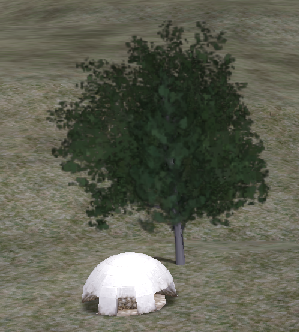The Wiki for Tale 4 is in read-only mode and is available for archival and reference purposes only. Please visit the current Tale 11 Wiki in the meantime.
If you have any issues with this Wiki, please post in #wiki-editing on Discord or contact Brad in-game.
Indonesian Bee Hive
Source
This building becomes available after you have learned the Indonesian Bee Care skill.
Cost
Built in a Small Construction Site.
Details
Indonesian Beehives are symbiotic with Citrus Trees. Citrus Trees produce citrus fruit, and also flavor the type of honey that the Indonesian Beehives produce.
Indonesian Bee Care is required to build an Indonesian Beehive and also to collect honey from it, but anyone without the skill can mulch or gather fruit from a Citrus Tree.
Production
- Indonesian Beehives produce one honey about every 12 real life hours.
- Citrus Trees produce one citrus fruit about every 8 real life hours.
- Up to a maximum of 5 fruit and 5 honey can be built up before it will need to be gathered so that more can be produced.
Flavored Honey
You can only gather honey from an Indonesian Beehive if it is very close to two different fruit types of Citrus Trees. Two trees within range (about 15 coords) will be randomly chosen to flavor the honey.
For example:
- A Sweet Orange tree and a Greenish Lime tree would produce Lime-Orange Honey in the nearby Indonesian Beehives if those were the only trees nearby.
- A Sweet Orange and a Tangy Orange would produce normal, unflavored honey since they are both the same base fruit type.
Honey is an alphabetical combination of two different base types of fruit (and not the adjectives). Therefore there are 78 varieties of honey possible. Examples: Lime-Orange, Coralfruit-Lenat, Lemon-Lime.
Citrus Fruit
Citrus Trees have 4 statistics that determine what type of fruit is produced:
- Color
- Sweet
- Size
- Length
When a citrus tree first grows, two other trees within range (15 coords) are chosen to be the "parents" to help determine the variety of tree that grows.
If there are no trees within range to act as parents, then one of the following varieties will always be chosen:
- Tangy Orange (676 color, 650 sweet, 642 size, 533 length)
- Greenish Lemon (325 color, 311 sweet, 408 size, 621 length)
Every Citrus Tree has an option to "mulch" it or chop it down. In an hour of real time, a new tree will grow and will search for any trees in range to act as parents as above. Using this method, you can have 3 trees together, mulch one of them, and it will re-grow using the other 2 trees as parents. This seems to be an effect similar to crossbreeding.
There does seem to be a random effect involved in what new type of tree grows. Mulching the same tree multiple times will often produce a number of different new types. Presumably, if you know the numbers for the statistics of the type of tree you want, you can mix trees together, mulching the ones furthest away from your target numbers until you start getting closer and closer to what you want.
See Citrus Tree Data for raw data on different types of citrus trees
See also Citrus_Trees/bastet.
Citrus Fruit and Honey Types
There are 13 different base types of citrus fruit:
- Citron
- Coralfruit
- Corian
- Grapefruit
- Lemon
- Lenat
- Lime
- Mandarin
- Orange
- Pummelo
- Summerbell
- Tangelo
- Tangerine
There are 8 different adjectives used to describe the particular type of fruit:
- Flat
- Large
- Long
- Small
- Greenish
- Reddish
- Sweet
- Tangy
This means there are 104 different types of citrus fruit in all. Examples: Flat Tangelo, Greenish Lime, Sweet Lenat. The Test of Festivals only requires 52 out of the 104 different fruit types possible.
Honey is an alphabetical combination of two different base types of fruit (and not the adjectives). Therefore there are 78 varieties of honey possible. Examples: Lime-Orange, Coralfruit-Lenat, Lemon-Lime.
